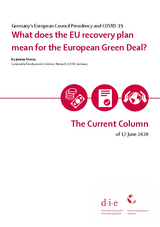The Current Column
Germany’s European Council Presidency and COVID-19
What does the EU recovery plan mean for the European Green Deal?
Sturm, JaninaThe Current Column (2020)
Bonn: German Development Institute / Deutsches Institut für Entwicklungspolitik (DIE), The Current Column of 17 June 2020
The meeting of the heads of state and government of the EU member states this Friday sees the beginning of negotiations regarding the ”Next Generation EU” recovery plan proposed by the European Commission. This foresees the mobilisation of 750 billion euros to help the EU emerge from the recession caused by the Covid-19 pandemic. At the same time, negotiations are also underway for the next EU budget (Multiannual Financial Framework, MFF) for the years 2021-2027, which, according to the proposal of the Commission, should comprise 1.1 trillion euros.
In its spring forecast for the economic situation of the EU, the EU Commission expects economic output in the second quarter to be around 16 percent lower than in the preceding year. It anticipates a fall in gross domestic product of around 7.5 percent for the year as a whole – significantly worse than in the financial crisis of 2009. The EU recovery plan looks to mobilise 750 billion euros, of which 500 billion euros should take the form of non-repayable grants and the remaining 250 billion euros as loans, spread across the EU budget.
These sums make it clear that the investments to be funded will aim to promote the transformation to sustainable development and climate protection required to meet the goals stipulated with the 2030 Agenda and the Paris climate agreement. How can this be achieved? Do the consequences of the current crisis not risk a return to outdated business models that stand contrary to the sustainability and climate goals?
Only a few months ago Commission President Ursula von der Leyen unveiled the European Green Deal as an ambitious programme for her presidency. With the Green Deal as growth strategy the European Commission is pursuing medium to long-term goals, including with regard to the 2030 Agenda and its 17 goals for sustainable development. One central objective is to achieve climate neutrality by 2050, which requires the transformation of sectors such as energy, industry, agriculture and transport. It is therefore to be viewed positively that the proposals of the EU recovery plan and the MFF reference the European Green Deal and therefore place a particular emphasis on climate protection and further sustainability goals in the areas of biodiversity, agricultural and the circular economy. The precise realisation of the Green Deal is currently being negotiated between the member states and with the European Parliament. Furthermore, the member states are to develop their own national stimulus programmes in accordance with national climate and energy plans. The specifics of this are yet to be determined, however.
In addition to how the funds are spent, refinancing and regulatory frameworks are also relevant to sustainability. Repayment of the debt incurred for the recovery plan is to occur via the EU budget from 2028 to 2058. This means new debt for a whole generation with social repercussions and shows how today’s decisions and investments will affect future generations.
To finance the debt, the recovery plan proposes, amongst other things, the expansion of the emissions trading system, a digital tax or a plastic tax. Such instruments can make an effective contribution to achieving the climate and sustainability goals.
Beginning in July, Germany will hold the European Council Presidency until the end of the year, a term that will be characterised by the effects of the corona pandemic and the efforts to manage it. The Council Presidency should be used to mould the processes of the EU recovery plan and the MFF in a way that delivers decisive impulses for an orientation towards climate and sustainability goals. A further summit of the EU heads of state and government will take place in July, tasked with reaching agreement on the EU recovery plan.
Agreement also needs to be reached within the EU regarding a new interim goal for climate protection to reduce climate-harming emissions by 50 to 55 percent by 2030 compared to 1990. These improved national climate plans (Nationally Determined Contributions, NDCs) are to be resolved in the second half of the year. This should be taken into account when negotiating the EU recovery plan, to ensure that investment goes to sectors that enable the achievement of these goals. This could include the setting of a minimum CO2 price in the European emissions trading system or the expansion of CO2 pricing to all economic sectors.
So far, social aspects, healthcare and education as well as the international dimension are not sufficiently represented in the European Green Deal. In contrast, the recovery plan addresses social issues and the international dimension. If both concepts are oriented towards the diverse sustainability goals, the EU recovery plan, in conjunction with the Green Deal, may prove an opportunity to achieve long-term goals in the transformation towards sustainable development.
This Current Column is part of a special series that is exploring the developmental and socioeconomic consequences of the corona crisis. You can find more articles like this on The Current Column’s overview page.
- Coronavirus as an opportunity for international cooperation
- Why social protection is crucial in the corona crisis
- How we will need to tackle climate migration post-coronavirus
- Parallels between the corona pandemic and climate change
- What we can learn from and about Africa in the corona crisis
- How the EU and rising powers can shape their future sustainably
- How the corona crisis is calling into question the “right to the city”
- Is the coronavirus threatening a developing-country debt crisis?
- Is the pandemic deepening the digital divide?
- Tackling the pandemic without doing away with democracy
- How the international financial institutions are responding to the pandemic
- Assuring equitable access to COVID-19 vaccines and treatments
- The marginalised as the weakest link in pandemics
- Incentives and rules for fair supply chains
- From COVID-19 to climate action
- How to respond inclusively to COVID-19 in the interests of the common good
- Why the Corona crisis is particularly difficult for right-wing populist governments
- What does the EU recovery plan mean for the European Green Deal?
- Growing inequality can worsen the pandemic’s effects
- COVID-19 has not killed global populism
- A fundamental transformation of tax systems is needed in the wake of Covid-19


